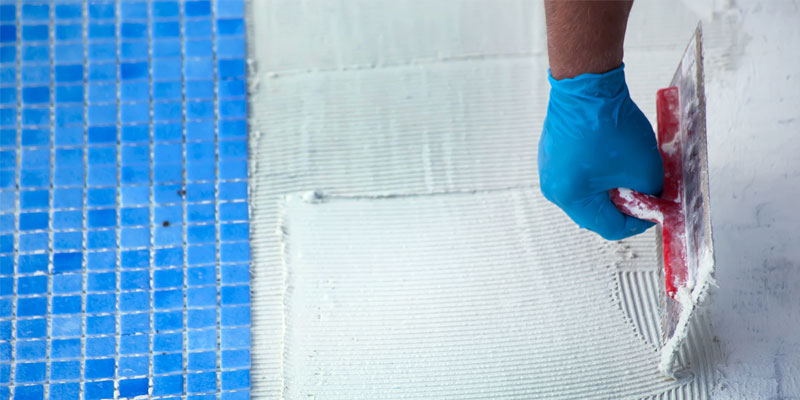Creating the perfect backyard getaway comes down to attention to detail. It might be a pool or a patio, but both of these areas typically have one thing in common: stone. Whether it’s flagstone, bluestone, granite, travertine, or something else entirely, choosing the right material is important because it will be a focal point for your yard.
As you could probably guess from its name alone, Arizona is home to plenty of large rocks, some better than others when it comes to using in your yard and around your pool. Before we begin exploring what kind of materials are used most often in Phoenix homes and pools, let’s take a look at each type and its properties individually.
Why is a Pool Deck Important?
In Arizona, where the summers are often dry and hot, a pool deck is not only a place to relax but also a way to bring a unique look and feel to your backyard. The point of using stone in this area is not only its durability against the heat but for how it will reflect light from both the sun and any water that might be present on the surface.
These surfaces are usually made using slabs or tiles, depending on which style you prefer most. If your pool deck is immediately next to the water, flagstone is always a good choice because it doesn’t absorb moisture. For this reason, it is also perfect for pools with automatic cleaners since it’s not susceptible to scratching like other materials such as limestone and sandstone (which can be very slippery when wet).
By placing the correct stone in the correct space, you can take your yard and pool from basic to breathtaking in no time. Here’s a quick breakdown of each material we’ll cover:
Flagstone:
When it comes to natural stone for pool decks or patios, flagstone is one of the most popular options because it is both durable and versatile. Great for entryways like steps and walkways, flagstones also add character when used as a border around your pool deck or even as an accent piece.
However, when using flagstone around a pool area, be sure that its thickness won’t cause any trip hazards, and note that it isn’t recommended if areas experience heavy foot traffic. If you’d like to incorporate flagstones into your pool area, choose thinner pieces, so they don’t take away from the look of the water.
Bluestone:
This is a great option for pool decks, as it can withstand a high amount of foot traffic and comes in a variety of shades ranging from light gray to black with veins that resemble crushed blueberries. Bluestone is one of the most durable stones on this list and makes for an excellent choice if you plan on spending plenty of time by the water.
Be sure to seal bluestone every few years to prevent staining, and avoid using it in areas with high amounts of moisture as it can warp.
Granite:
Granite is another popular stone option for patios and pool decks because it is durable and comes in a variety of colors, including shades of gray, black, white, and brown. It also has a nice texture that makes it slip-resistant.
One thing to note about granite is that its weight can make installation difficult, so be sure you have a professional on hand if you choose this material. Additionally, acid-based cleaners can damage granite, so use caution if selecting this stone for your deck.
Travertine:
Travertine is a popular choice for both patios and pool decks, as it is quite easy to maintain. This stone comes in a variety of colors, including various shades of beige, browns, and grays.
One thing to keep in mind when using travertine around your pool area is that while it’s extremely durable, its aggregate can pose a hazard on some surfaces if they aren’t properly sealed or installed correctly. If you’re worried about the safety of travertine on your deck or patio, asphalt tile might be a better option because it isn’t as slippery when wet.
Slate:
For pool decks and walkways around pools with plenty of foot traffic, slate might just be your best bet. Slate is known for its durability; it’s also one of the most slip-resistant stones available.
While slate is a great option for pool decks, it can be quite expensive, so be prepared to spend a bit more on this material.
Sandstone:
Sandstone is another affordable option for pool decks that still offers plenty of durability. This stone comes in a variety of colors, including shades of red, yellow, and orange, and usually has a textured surface for added safety.
One thing to keep in mind with sandstone is that it can be prone to staining if not sealed properly. Be sure to use a sealant at least once a year to protect your investment.
Now that you have an idea of some of the most popular stone materials, you might have a better idea of what’s right for your pool deck.
Pros and Cons of a Stone Pool Deck
Stone pool decks come with a variety of pros and cons that you should take into consideration before making a final decision.
Pros:
- Stone is extremely durable and can withstand a lot of foot traffic, making it perfect for busy pool areas.
- There are a variety of colors and textures to choose from, so you can find the perfect look for your space.
- Stone is usually quite affordable compared to other materials.
Cons:
- Installation can be difficult, so it’s best to have professional help with this project.
- Stone can be susceptible to staining if not sealed properly.
- It can also be when wet, so take caution when walking
Be sure to contact one of our professionals if you have any questions about the materials mentioned above or if you want more suggestions on a great outdoor material!





